Microsoft Azure Certification & Various Azure Certification Paths
Hi cheers, I hope you’re eagerly waiting for my next blog. So, in this blog, we will briefly know “Microsoft Azure Certification.” Before that, read the blog “What is Microsoft Azure & What is an Azure Cloud Service?” and have some technical knowledge of Microsoft Azure.
Introduction to Microsoft Azure
Microsoft Azure is a cloud computing platform that enables users to design, deploy, and maintain applications and services over an interconnected group of servers in data centers around the globe.
Azure provides a versatile and scalable solution, offering infrastructure-as-a-service (IaaS), platform-as-a-service (PaaS), and software-as-a-service (SaaS) options.
Azure also provides services like virtual machines, storage, networking, databases, analytics, and AI capabilities – the list is endless.

Microsoft’s Azure platform users can quickly and easily create virtual machines, deploy web apps, store and analyze large amounts of data, and connect to other Microsoft services like Office 365 and Dynamics 365. With its range of tools, creating these tasks becomes a piece of cake.
Azure offers comprehensive security options, allowing you to keep your data and programs safe.
Types of Microsoft Azure Certification
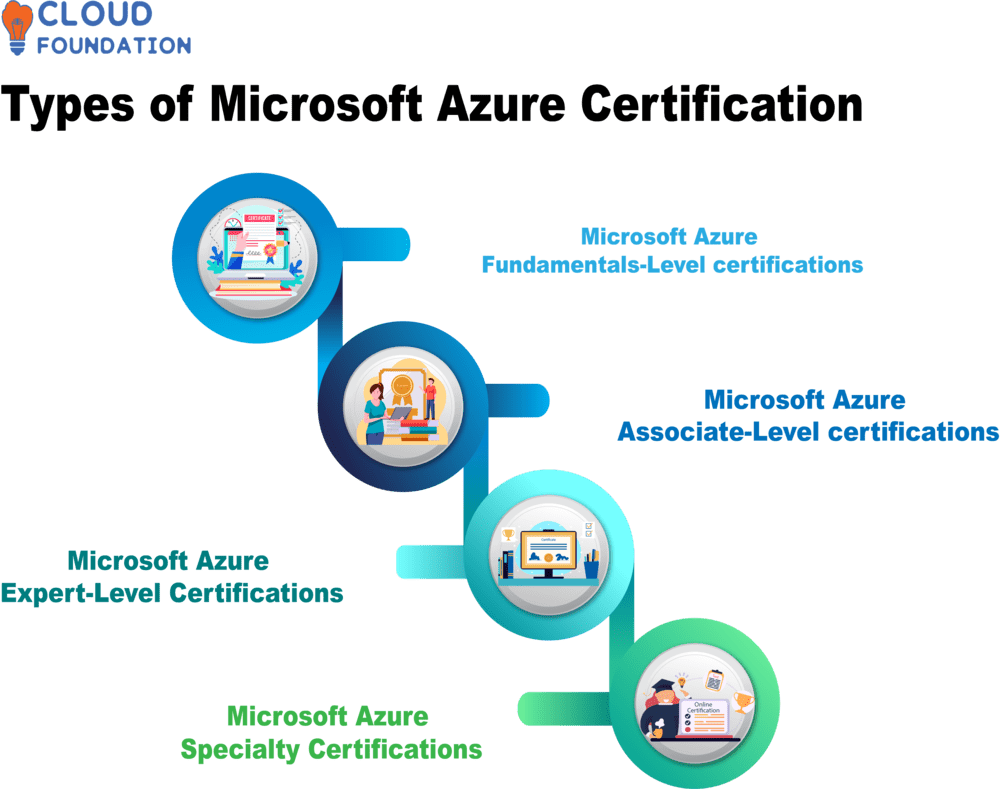
Microsoft Azure Fundamentals-Level certifications:
Microsoft Certified: Azure Fundamentals – Exam AZ-900S
Microsoft Certified: Azure AI Fundamentals – Exam AI-900
Microsoft Certified: Azure Data Fundamentals – Exam DP-900
Microsoft Certified: Security, Compliance, and Identity Fundamentals – Exam SC-900
Microsoft Azure Associate-Level certifications:
Microsoft Certified: Azure Administrator Associate – Exam AZ-104
Microsoft Certified: Azure Developer Associate – Exam AZ-204
Microsoft Certified: Azure Security Engineer Associate – Exam AZ-500
Microsoft Certified: Azure Data Scientist Associate – Exam DP-100
Microsoft Certified: Azure Data Engineer Associate – Exam DP-203
Microsoft Certified: Azure Database Administrator Associate – Exam DP-300
Microsoft Certified: Security Operations Analyst Associate – Exam SC-200
Microsoft Certified: Identity and Access Administrator Associate – Exam SC-300
Microsoft Certified: Azure AI Engineer Associate – Exam AI-103
Microsoft Certified: Azure Network Engineer Associate – Exam AZ-700
Microsoft Azure Expert-Level Certifications:
Microsoft Certified: Azure DevOps Engineer Expert – Exam AZ-400
Microsoft Certified: Azure Solutions Architect Expert – Exam AZ-305
Microsoft Azure Specialty Certifications:
Microsoft Certified: Azure for SAP Workloads Specialty – Exam AZ-120
Microsoft Certified: Azure Virtual Desktop Specialty – Exam AZ-140
Microsoft Certified: Azure IoT Developer Specialty – Exam AZ-220
Microsoft Azure Networking Certification
Many Microsoft Azure networking certifications exist:
 Microsoft Certified: Azure Network Engineer Associate
Microsoft Certified: Azure Network Engineer Associate
This certification verifies the knowledge and abilities required to design, construct, and support Azure networking systems. Applicants should possess expertise in deploying virtual networks, configuring Azure DNS settings, safeguarding virtual networks, and setting up Azure load balancing.
Microsoft Certified: Azure Security Engineer Associate
This certification verifies the skills and knowledge necessary to design and deploy Azure-based solutions, including networking. Applicants should be capable of creating virtual networks, configuring Azure DNS settings, setting up Azure VPN connections, and using ExpressRoute services.
Microsoft Certified Solutions Architect Expert
This certification certifies the skills and knowledge necessary to implement security controls and threat prevention, manage identity/access, and protect data, applications, and networks in cloud or hybrid environments like Azure.
Applicants should be capable of implementing network security protocols, setting virtual network connections, and configuring security groups within these networks.
To prepare for any of these certifications, you can take courses on the CloudFoundation platform and practice your skills using Azure documentation and hands-on labs. Working in a professional setting could also be advantageous in gaining practical experience with Microsoft Azure.
Microsoft Azure Machine Learning Certification
This certification program aims to demonstrate competency in designing and deploying Azure’s Artificial Intelligence and Machine Learning Solutions.

You can earn two credentials on this path, Azure AI Engineer Associate certification and Azure Data Scientist Associate certification.
The Azure Data Scientist certification focuses on building and operationalizing machine learning solutions in Azure. In contrast, the Azure AI Engineer certification covers designing and implementing AI solutions using natural language processing, speech recognition, computer vision, and predictive analytics.
Microsoft Azure Machine Learning Examples
Candidates for these certificates should possess a comprehensive knowledge of Azure data, including Azure Machine Learning and Cognitive Services.
Preparing for these certifications may be made more accessible by gaining practical experience working with Azure Machine Learning in a professional setting and investigating open-source tools and frameworks for machine learning, such as TensorFlow and Porch.
Here are several instances of Azure Machine Learning in action:

Predictive Maintenance: with Azure Machine Learning: Businesses can create predictive models that anticipate equipment breakdowns and schedule maintenance accordingly, helping reduce downtime while saving money.
Fraud Detection: Azure Machine Learning can be utilized to detect fraudulent activity in financial transactions. Companies can uncover trends and anomalies that may indicate fraudulent behavior by examining transaction data and applying machine learning algorithms.
Image Recognition: Azure Machine Learning can recognize objects in images or movies, with applications ranging from autonomous driving to security surveillance.
Natural language processing (NLP): Azure Machine Learning can be utilized for NLP tasks like sentiment analysis and chatbots. This could be especially beneficial in customer service applications where chatbots provide real-time consumer assistance.
Azure Machine Learning can analyze patient data, such as electronic health records, to detect trends and forecast patient outcomes. This could aid healthcare practitioners in providing better patient care while saving costs.
Microsoft Azure DevOps Certification
Microsoft Azure DevOps certification confirms your expertise in crafting and deploying Azure DevOps solutions.
This course offers the Azure DevOps Engineer Expert and Solutions certifications. The Azure DevOps Engineer Expert certification is for professionals experienced in CI/CD, infrastructure as code (IaC), monitoring, and logging using Azure services such as Kubernetes Service, Container Instances, and App Service.

The Azure DevOps Solutions certification is for professionals who have successfully managed projects and processes using Agile tools, source control, build/release management, and Azure DevOps.
To prepare for these certifications, candidates should be well-versed in DevOps principles, Azure DevOps, and Azure services.
Microsoft Learn can assist certified individuals with preparation. Certified individuals may benefit from having some professional experience under their belt.
Microsoft Azure Active Directory Certification
Earning the Azure Active Directory (AAD) certification demonstrates your expertise and ability to design and implement secure identity and access management solutions using Microsoft Azure.
This certification path involves Microsoft Certified Identity and Access Administrator Associate and Microsoft Certified Azure Security Engineer Associate.
The Identity and Access Administrator Associate certification focuses on managing identity and access with Azure AD. This includes administering users and groups, protecting identities, and establishing authentication and authorization processes.

The Azure Security Engineer Associate certification teaches you how to implement security controls and safeguard against threats.
To prepare for these certifications, candidates should have extensive knowledge of identity and access management (IAM) principles, be proficient with Azure AD, and have previously worked with Azure security services.
Candidates can prepare for certification exams using CloudFoundation learning platform and
Who Should get Microsoft Azure Certified?
Microsoft Azure certifications are for IT professionals working with Azure, Microsoft’s cloud computing platform. These credentials demonstrate a candidate’s expertise in deploying, administering, and implementing Azure solutions.
Individuals that could benefit from becoming Azure certified include IT Professionals: If you’re an IT pro specializing in cloud computing, an Azure certification can provide valuable knowledge of Microsoft’s cloud platform and expand your career prospects.

Developers: Azure offers various services for developing, deploying, and managing applications. If you’re an experienced developer looking to create secure cloud-based programs, earning an Azure certification can give you the necessary abilities.
Cloud Architects: Cloud architects create, plan, and implement cloud-based solutions for businesses. A certification in Azure can give cloud architects insight into Microsoft’s platform and enhance their ability to design and deploy such solutions effectively.
System Administrators: System administrators are accountable for managing and maintaining an organization’s IT infrastructure. A certification in Azure gives these professionals proficiency in administering Azure resources, which can reduce costs while increasing the overall efficiency of an organization’s IT system.
Business Analysts: Earning an Azure certification can give business analysts insight into Azure’s capabilities and how they can be applied to solve business issues. This gives your organization better insights and enhances your career prospects.
Azure certification benefits those specializing in cloud computing, creating cloud-based applications, designing and deploying cloud-based solutions, or managing and maintaining an organization’s IT infrastructure.
Demand for Microsoft Azure Certified Professional
As more businesses transition their IT infrastructures into the cloud, demand for certified experts in this area will remain strong and increase.
Cloud computing has recently seen a meteoric rise, and Microsoft Azure is one of the most widely utilized cloud systems. With Amazon Web Services (AWS) and Google Cloud, Microsoft Azure is one of the top three leading cloud platforms, and its use is only expected to expand.
Experts in installing and maintaining Azure systems are in high demand, with many companies searching for certified experts to fill these roles. Due to the market, these professionals tend to receive above-average salaries.
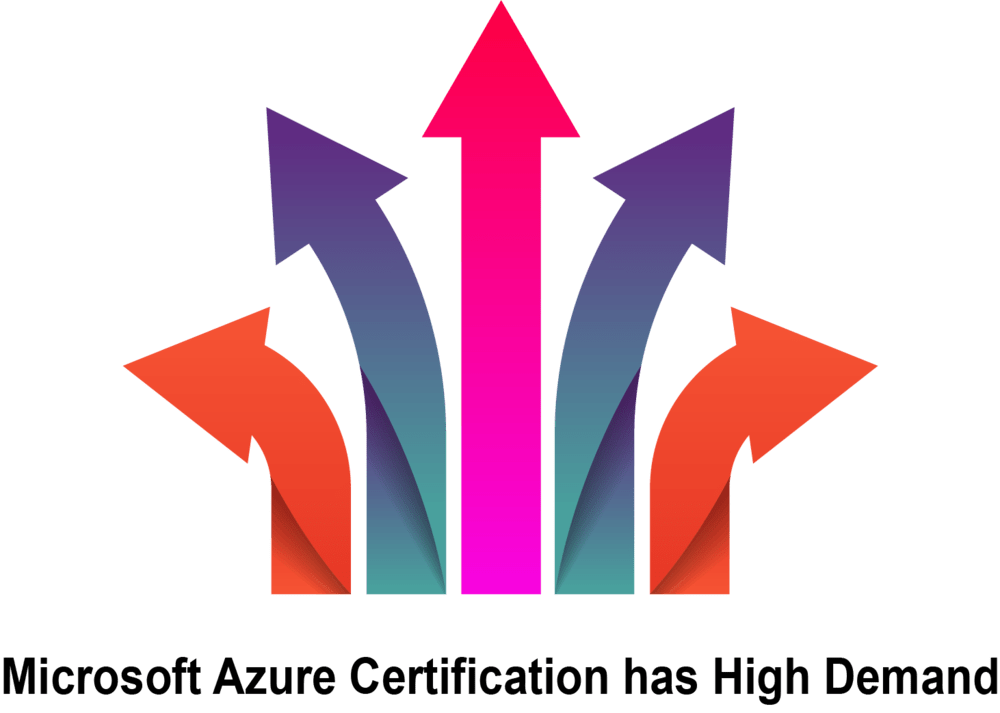
Additionally, workers can advance their careers and unlock new possibilities by earning Microsoft Azure certifications.
Therefore, as more businesses move to cloud computing, the need for certified Microsoft Azure professionals will only grow over time.
Certified Azure professionals may enjoy high salaries and numerous career options within the IT sector.
Microsoft Azure Salaries
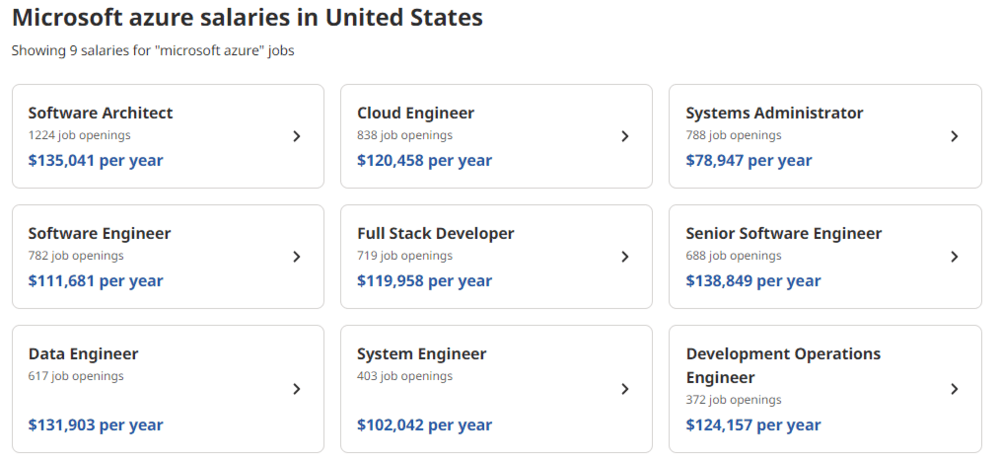
Is Microsoft Azure Certification worth it?
Depending on your career objectives and aspirations, Microsoft Azure certification could be beneficial.

Azure is a widely-used cloud computing platform many businesses use. Thus certification in this area demonstrates your skillset and knowledge to potential employers.
Azure certifications come in three levels Fundamentals, Associate, and Expert. Each one emphasizes a particular skill set or area of specialization.
These certifications can boost your earning potential and enable you to progress in your career by showcasing your proficiency with Azure.
However, it is essential to note that more than certification may be needed to secure a position or progress within the company.
Microsoft Azure certification still require practical experience and an in-depth knowledge of the platform and its services. Azure certification can be a great addition to your resume, helping you stand out in an increasingly competitive job market.
How Hard is Microsoft Azure Certification?
Microsoft Azure certification complexity varies based on your knowledge and experience with Azure.
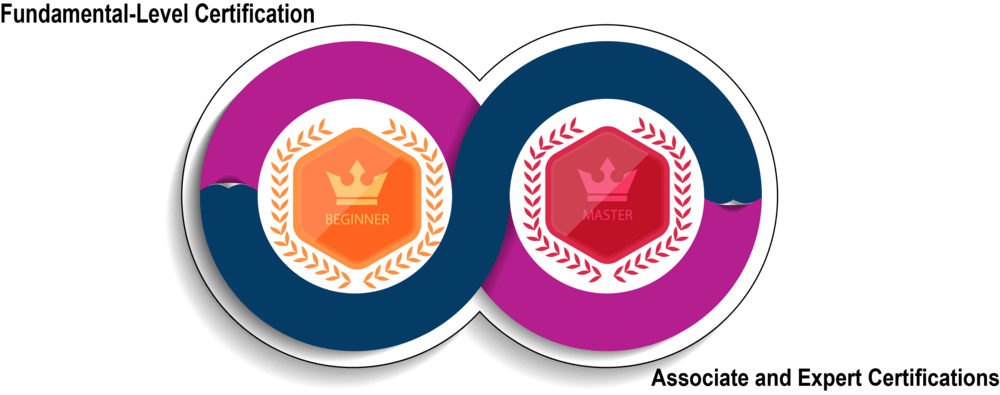
Fundamental-level Certification: Microsoft Azure Basics is ideal for cloud computing and Azure newbies, these examinations cover essential services and concepts related to Azure.
Associate and Expert certifications: Azure Administrator Associate and Microsoft Certified Azure Solutions Architect Expert require a deeper understanding of Azure services, design, and implementation. These tests may be challenging, so extra practice may be necessary to pass them successfully.
Microsoft Azure certification tests vary in complexity depending on your level of Azure knowledge and the certification sought.
Microsoft Azure Certification Cost
The cost of Microsoft Azure certification exams varies based on the exam tests cost between $99 and $499.
Exams at the fundamental level, such as Microsoft Certified Azure Fundamentals, are less costly than tests at associate and expert levels.
Microsoft Azure Certification Exam
The Microsoft Azure Certified Solutions Associate and Azure Solutions Associate exams assess IT professionals’ expertise in Azure technologies.
Microsoft Certified Azure Fundamentals measures applicants’ understanding of Azure’s services and solutions.
Microsoft Certified Azure Solutions Architect Expert exams assess candidates’ knowledge of designing, building, and deploying Azure systems.
Number of Questions: 40 – 50
Duration: 60 Minutes
Passing Score Required: 700
To achieve Microsoft Azure certification, candidates should read Microsoft material, take practice exams and attend online courses. Microsoft Learn offers certification courses as well as practice exams for this purpose.
How to get Microsoft Azure Certification?
Receiving your Microsoft Azure certification can be done in several ways. Follow these general steps to earn your Microsoft Azure certification:
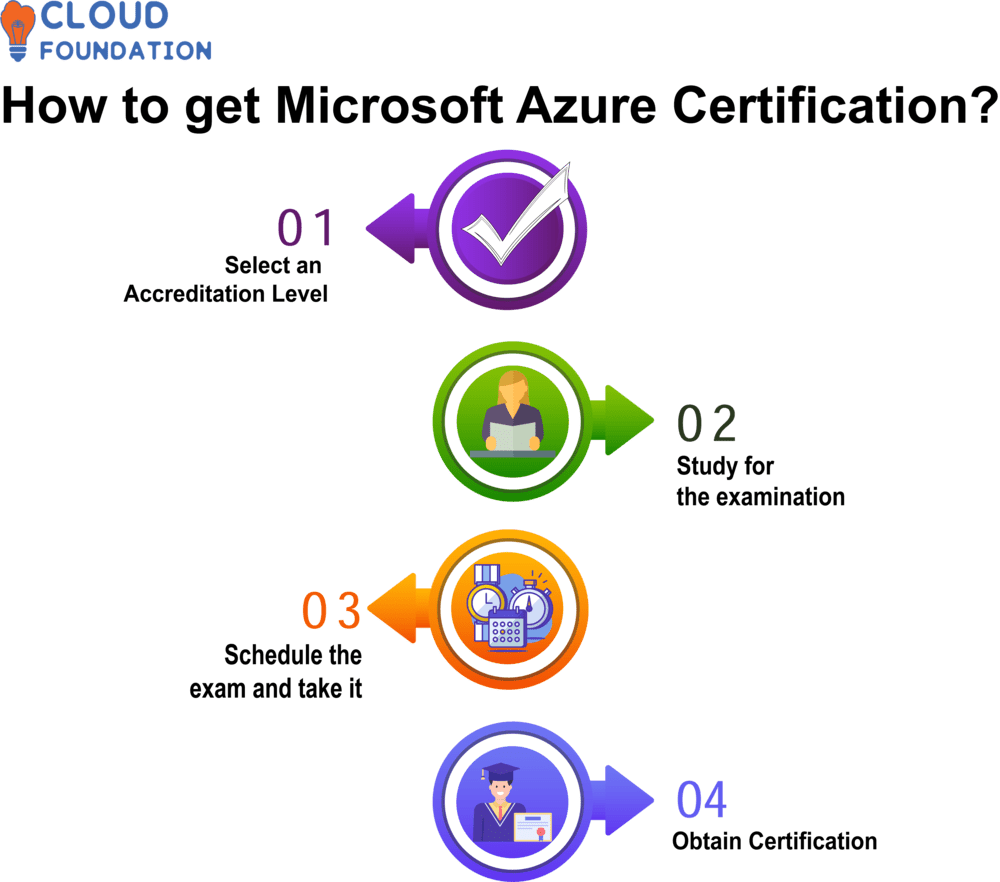
Select an Accreditation Level: Evaluate which Azure certification fits your experience and expertise best. Microsoft offers various skill levels, such as fundamental, associate, and expert credentials.
Study for the examination: CloudFoundation is a learning platform it can help you to access Microsoft Azure recorded sessions and study materials such as blogs, Microsoft Azure online courses, and practice examinations.
In this mode, you will be instructed by experienced trainers and will have access to technical support 24 hours a day, seven days a week.
Schedule the exam and take it: You may take the exam in person at a testing center or virtually, depending on when and where it’s administered.
To pass the exam, you must achieve a qualifying score which varies from exam to exam. If your first attempt fails, you may retry the exam after an agreed-upon period.
Obtain Certification: Microsoft will award you certification once you pass the exam. However, this certification is only valid for a certain period and may need renewal or recertification.
Acquiring a Microsoft Azure certification takes time, dedication, and effort. By taking these steps and investing in adequate preparation, you can improve your chances of success and showcase your Azure skillset to potential employers.
Microsoft Azure Certification Process
Becoming certified in Microsoft Azure involves selecting a certification corresponding to your current expertise with Azure, successfully passing an exam, and earning recognition for your efforts.
Preparing for the exam includes gaining hands-on experience with Azure and studying relevant resources, scheduling and taking your exam either at a testing center or remotely, receiving your results and earning certification from Microsoft;
Maintain your certification by renewing or recertifying it as necessary, and finally, ensure that you retake the exam when needed.
While this process requires time, effort, and focus to complete, you can demonstrate your capabilities in Azure to potential employers, helping you advance your career in cloud computing.
CloudFoundation provides has many alternatives and resources to enable people of varying expertise to achieve Azure certifications.

Saniya
Author
“Life Is An Experiment In Which You May Fail Or Succeed. Explore More, Expect Least.”


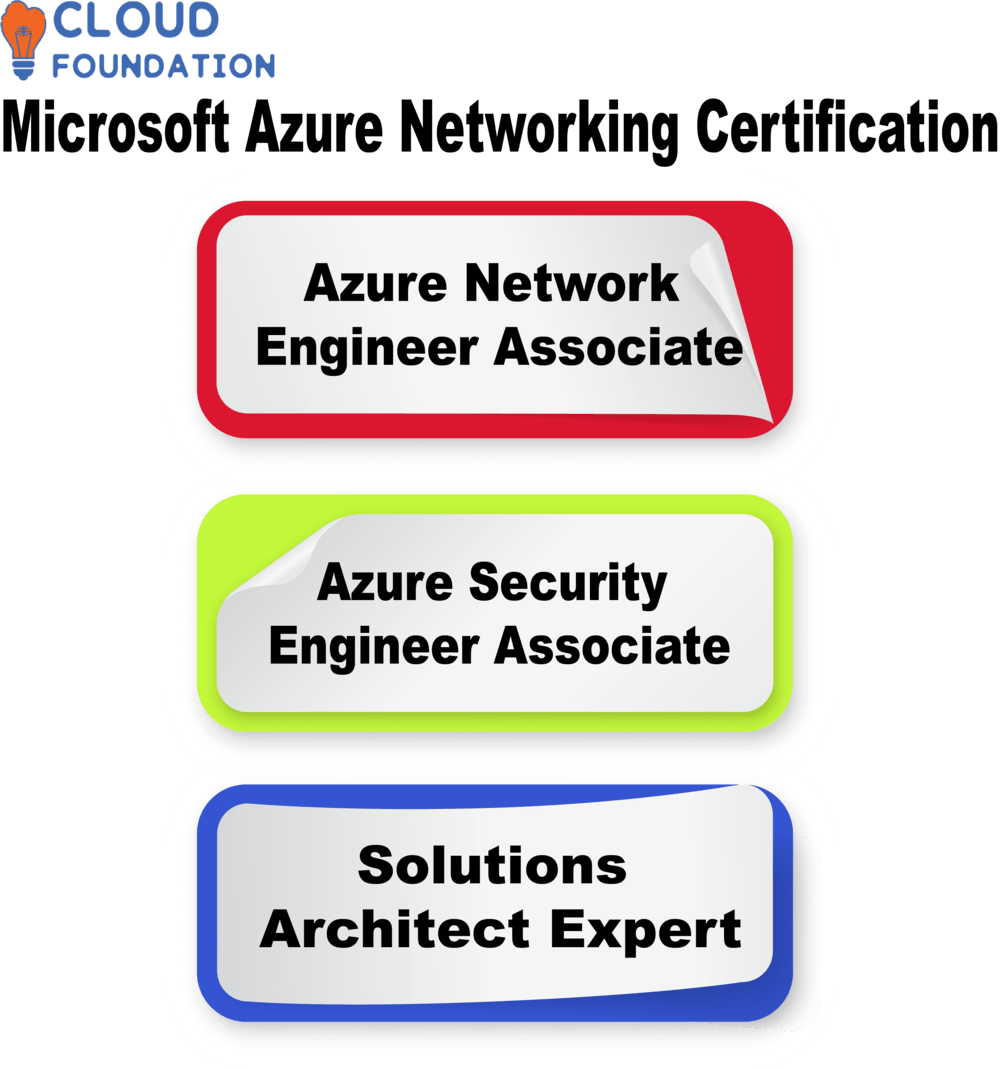 Microsoft Certified: Azure Network Engineer Associate
Microsoft Certified: Azure Network Engineer Associate
